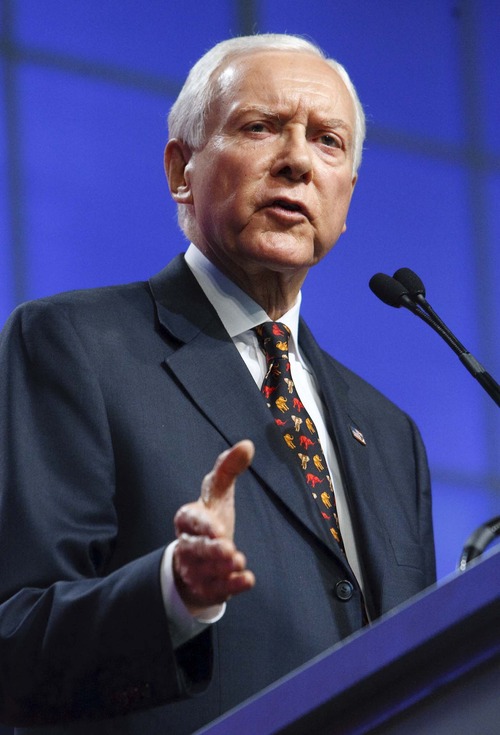This is an archived article that was published on sltrib.com in 2013, and information in the article may be outdated. It is provided only for personal research purposes and may not be reprinted.
Washington • Utah's Sen. Orrin Hatch says he doesn't buy the Obama administration's argument that the nation's borrowing limit will be hit Oct. 17 and says even if it is, the federal government can prioritize its payments without hurting the economy.
Hatch, the top Republican on the Senate Finance Committee, says he would back upping the so-called debt limit — essentially the country's credit card — if there are ongoing negotiations about restructuring America's entitlement programs, including Social Security and Medicare, but he downplays the idea that there's a hard deadline for Congress to move the needle.
"It may take some very effective juggling to handle the problems but the country isn't going to go down just because of that," Hatch told reporters outside the Senate chamber Tuesday. "That's why the markets are not being so disturbed now."
The Dow Jones industrial average closed down 160 points Tuesday, a decrease analysts attributed to the ongoing government shutdown and uncertainty about the debt-ceiling fight. The market is down 2 percent in the past five business days.
Treasury Secretary Jack Lew has said the government will reach its maximum borrowing limit Oct. 17 and has warned of dire consequences if Congress doesn't approve a hike. While raising the limit allows the country to borrow more money, it doesn't authorize new spending.
President Barack Obama on Tuesday quickly disputed the idea of prioritizing payments in lieu of increasing the debt limit, noting that there are senior citizens who need Social Security checks, veterans counting on benefits, government contractors looking for payments and military payrolls to take care of.
"All those folks are potentially affected if we are not able to pay all of our bills on time," Obama said. "What's also true is, if the markets are seeing that we're not paying all our bills on time, that will affect our creditworthiness even if some people are being paid on time."
"And," Obama added, "When I hear people trying to downplay the consequences of that, I think that's really irresponsible."
The debt limit is different than the budget impasse that led the government to the current shutdown — the first in nearly 18 years — though the two issues are becoming more and more conflated as the stalemate continues. Any solution to the budget crisis is likely to include a deal to raise the borrowing limit.
Both Republicans and Democrats remain stuck to their talking points more than a week into the shutdown, and some conservatives say they aren't going to support passing a stopgap spending measure or boosting the nation's debt limit without concessions — like spending cuts — from the opposing party.
Still, Oct. 17 has become the rigid deadline for many.
"It's a danger to flirt with any date other than that," said Rep. Jason Chaffetz, R-Utah. "The markets would not react favorably" if Congress doesn't act by then.
Outside groups have suggested there is more wiggle room than the Treasury Department warns.
The Bipartisan Policy Center says the actual date the debt limit will be hit is between Oct. 22 and Nov. 1.
For his part, Hatch says Lew is one of the "partisan, political" Treasury secretaries and that his target date for the debt ceiling is "slanted." Still, Hatch wants a deal sooner rather than later.
"Whatever [the deadline] is, it's important for us to work it out before [then] if we can," Hatch said. "I think we can but it's going to take good faith on both sides, not just one side."



